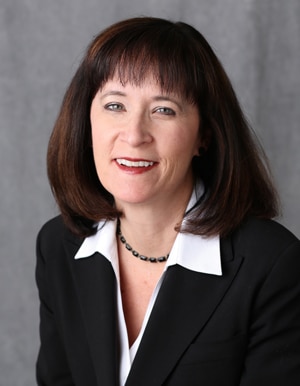Take a closer look at Beth Townsend


Hometown: Shenandoah
Education: Bachelor’s degree in business administration, University of Nebraska at Kearney; law degree, University of Nebraska-Lincoln
Family: One son, Sam
Hobbies: Travel, mowing, playing with dogs
Connect with her on LinkedIn
When Gov. Terry Branstad needed someone to repair or resuscitate a broken agency, he twice turned to Beth Townsend, a lawyer and a former JAG (judge advocate general) with the U.S. Air Force.
First, the Shenandoah and former Nebraska resident turned around the Iowa Civil Rights Commission, which had gained a reputation for a big backlog of cases that Townsend and her team whittled. Then, in February, Branstad appointed Townsend as director of Iowa Workforce Development.
Townsend is an Iowa Cubs fan with two degrees from the University of Nebraska system and a history of following the Kansas City Royals. She credits her parents for convincing her she should aim high in her career, studying to become an administrator rather than a rank-and-file worker, discrimination against women in the workplace aside.
For a recent Closer Look feature in the Oct. 2 Business Record newsmagazine, Townsend answered a few additional questions exclusively for Lift IOWA readers.
What advice would you give women in administration?
The only limits you have are those that are self-imposed. I can remember when I was growing up and my dad would ask me, “What do you want to be when you grow up?” I would say, “I want to be a nurse,” And he would say, “Why aren’t you going to be the doctor?” Or I would say, “I want to be the secretary,” and he would say, “Why don’t you want to be the boss? You can be the boss. You just need to get an education. That’s all you need.”
My mother had a chemistry degree from Oklahoma State University, and she graduated in 1958, I think. She had almost a 4.0 GPA in chemistry. She was one of a handful of women in a large school in the chemistry department. She had a hard time getting a job because she was a woman in the ’60s. She was brilliant. She was also a role model to me. I wanted to say, “You didn’t work after you had kids.” She said, “I made a choice to stay home and raise my children. But I have an education, and if I needed to take care of my family, I was in a position to do that. That’s how my mother raised me, and that’s how I’m raising you. You will get an education, and if you get married and choose to stay home and raise kids, that’s great, but you will have an education and you will be prepared to go out and work.”
Why are we having so much trouble getting girls and young women interested in STEM (science, technology, engineering and mathematics) careers?
I think it’s probably been the same issue we’ve always had in getting girls interested in science and math. There is always that perception that it is not an area of interest for you because you are a girl. Or maybe we just haven’t done a good enough job in promoting or articulating how those fields translate to almost every other field that you would be interested in. There are very few fields that a STEM background is not going to be beneficial in. So I think we need to do a better job in our education and explaining the benefits of that kind of exploration.




